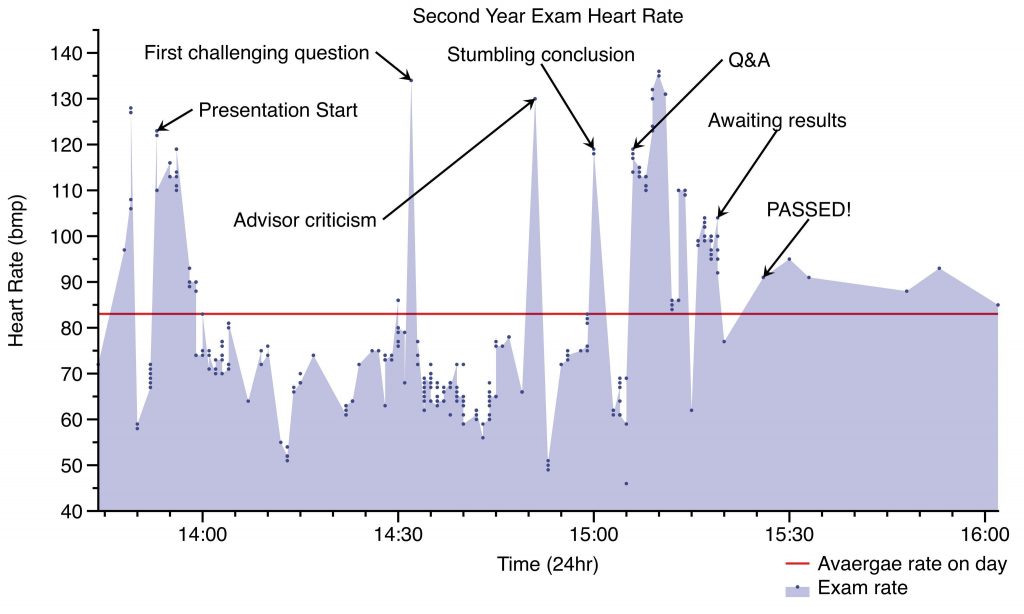If you are preparing to defend your thesis, you’ve come to the right place! This guide explains some pointers to consider when preparing for your thesis defense, both prior and during the thesis presentation. Before we can begin discussing some tips and best practices for preparing a thesis defense, we first need to define and differentiate between the different types of defenses that exist. Doctoral defenses (PhD defenses) follow a different format than bachelor or master thesis defenses. The format tends to vary greatly, depending on the country, so there are is no one size fit all policy with regards to the structure. There are however some general guideliens that are important to consider, regardless of the format.
[joli-toc]
What is a thesis defense?
The thesis defense, also known as thesis presentation or disputation in certain countries, signifies what is often the last and final part of your thesis journey. This is your moment to shine, where you are the center of the stage, to promote your thesis and discuss your results and your research. To some, this event is stressfull, particularly those who prefer not to speak in front of others (see our guide on public speaking) and for others, it’s an opportunity to finally be able to let the world know what you have been up to for the last few months (for master/bachelor theses) or for the last few years for PhD/doctoral theses work.
So how do we learn how to deliver a good thesis defense?
Learn from the mistakes of others…
Many years ago, when I was still in the early phases of my PhD, one of my academic supervisors, a late Professor of Civil Engineering, suggested that I enroll in a dissertation analysis course. The “course” was comprised of me sitting through several thesis / dissertation defenses and jotting down anything that I could learn from them. This included, how well the PhD candidate defended their thesis, what kind of criticism or points were reoccurring, and any other observations that I had regarding the thesis defense. This proved to be a very valuable exercise. This is an exercise that you can (and perhaps should) undertake yourself, not in a formal “course” setting, but rather by listening in and taking part in other peoples’ public thesis defenses. Although not all thesis defenses are public, most tend to be, and there is a lot that you can learn by observing the defense from the point of view of the audience.
So how do you find a thesis defense to listen in on?
The best case scenario would be to listen to theses defenses delivered by students in the same research area and university, if that’s not possible, a different thesis topic but still fairly tangential to your research area would also be useful. These days (I am writing this guide during the covid pandemic of 2020/2021), it is extremely easy to take part in thesis defenses online via Zoom as they are often publicized in advance and can be found by browsing your universities’ online events calendar.
So what did I learn through the numerous theses that I listened to?
The first thing I noticed that was a recurring theme, a question that seemed to appear in all the theses defenses that I attended, had to do with how the student’s work contributed to their research field. What is special with your research? What new findings have you been able to lay forth; or which previously known findings have you been able to amend? This is the the central point that all of your research enquires revolve around, the raison d’être of your research, what are the contributions that you are bringing, and why should we care?
Of course, the bar is much set much higher for doctoral theses work compared to bachelor and master thesis, but the point still stands. This does not mean that each and every thesis that is published needs to be groundbreaking and ignite a paradigm shift. In fact, most thesis work do not lead to any revolutionary contributions. This point is perhaps best illustrated by satirical web sites such as lolmythesis where students submit their real thesis titles alongside a more comical title in plain English. This gives rise to titles such as this one from Yale University with the plain title “UAV deployment for fine-scale CO2 estimation in a mid-size city” which the author claims could also be titled as “I collected all my data then realized I didn’t record the variables needed for the one thing I promised to do in the title of my thesis”.
Do not stress over the significance of your research contributions, but do be prepared to defend them publicly.
What concrete contributions can you claim came about as a result of you having done this study of yours? If you can not answer that question (or at least explain why why your results were or were not remarkable), then you are out on dangerous water. There is an expectation that these contributions that we bring should actually have some form of substance, which they unfortunately do not always have. The site lolmythesis is a testimony to that, it perfectly encapsulates what it means to publish theses. Here are some more examples to put your mind at ease:
| Real title | Plain English | University |
|---|---|---|
| Fire and Environmental Change in Northern Australian Savannas during the Holocene | Over thousands of years, sometimes there were more bushfires than now. Sometimes there weren’t | Earth science, James Cook University |
| Technical Art History as a Bridge Between Conservation and Art History: Methodology, Development and Assessment | Trying to define a field no one has defined and that has no sources | Principles of Conservation, University College London |
| Searching for Long-Lived Dark Photons with the Heavy Photon Search Experiment | Does a hypothetical particle exist in a very narrow region of parameter space? I don’t know, we actually didn’t collect enough data | Physics, Stanford University |
Keeping a strong mind set
The table above reminds us not to take things too seriously. If you feel that your results are underwhelming, you may consider yourself a member of the academic club, everyone tends to produce results at one point in their research career that they themselves consider underwhelming. For the defense however, the key here is not to focus on the results themselves, but rather on the overall arguments and the overarching discussion that surrounds your results and provides a context to your key points. Be ready to defend and explain anomalies in data, or the specific choices that you made with respect to why you chose a specific research method instead of another. The thesis defense should be viewed as an exercise for you to be able to explain your overall argument and show why it is consistent. Remember that the thesis defense does not exist for you to be criticized with regards to other peoples data or research. As long as you have a strong grasp of your own research topic, you should be able to breeze through the defense. You can feel assured that (for most cases) no external expert or review committee will know more about your specific thesis than you do. As long as this disparity in knowledge holds true, it doesn’t matter how much more they know about the overall research field, if you are more knowledgeable of your specific research inquiries and their underlying assumptions.

The second point that I want to highlight is that all of your conclusions should follow from the results that has been presented (which in turn come from the data that you collected, depending on research area). With other words, all of the conclusions that are mentioned should follow logically from the underlying premises. I remember once attending a thesis defense where it was clear that the doctoral student highlighted certain conclusions that had no basis in the person’s data, and that sort of things tends to get highlighted real fast. So you need to be careful about that.
The third point concerns quality. The work must of course be of high quality, this is understood by all, but it also means that the data was gathered properly and that the sources that you cite are relevant and authoritative. Make sure that the image/story that you are presenting during your defense is internally consistent. Thus, even if an opponent has issues with a specific method that you chose, they cannot claim that your research contradicts itself. Apparent contradictions can be very problematic, and if you suspect that there might be a contradiction somewhere in your thesis, you need to be ready to explain that paragraph if asked to.
The last thing I want to mention has to do with the mental state of the one who is presenting. There is no doubt that public speaking is stressfull for a lot of people, and it is therefore extra important to remember to not place to much weight on the matter. It is after all only a speech. You know the topic, why worry, you literally wrote a book on it! As one says in swahili, hakuna matata is an appropriate attitude to have towards the thesis defense. It is important to remember that studies, specifically doctoral studies, are more than just a written dissertation. Instead, it encapsulates the whole process where you gradually learn more about your specific research work. Regardless of whether you achieve a undergraduate, postgraduate or doctoral degree at the end of your research, that degree only symbolizes the start of a learning journey, and not the end. Unlike the common conception, PhD studies shouldn’t be viewed as a dreadful and draining undertaking that finally culminates in this large-scale orgasmic metamorphosis where you are transformed from this lowly caterpillar to become a fully-feathered and competent butterfly.
Resources
The list below contains a few links to real examples of theses defenses. Do check out the presentation by Dr. Ben Conrad which is really good example of a thesis defense done right, it manages to be informative, to the point as well as engaging the audience and the material.
| Presenter | Subject matter | University | PhD defense slides |
|---|---|---|---|
| Ben Conrad | Mechanical Engineering | UW Madison | Download slides | Watch Video |
| John Maheswaran | Computer Science | Yale University | Download slides |
| Justin Dauwels | Signal and Information Processing | ETH Zurich | Download slides |


